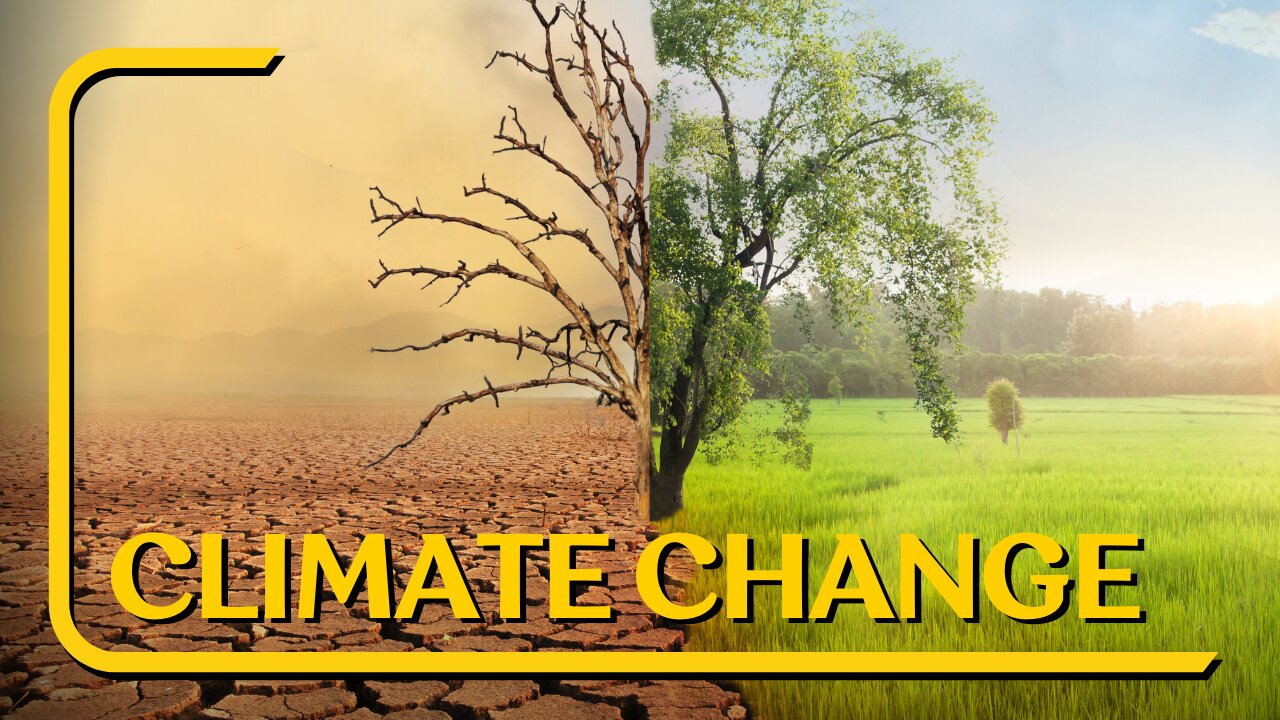Premium Only Content

Climate Chnage
Climate change refers to long-term alterations in the Earth's climate patterns, primarily driven by human activities and natural processes. It involves shifts in temperature, precipitation, sea levels, and weather patterns that occur over extended periods, typically decades to millions of years. Climate change is a multifaceted and complex issue with significant environmental, social, and economic implications. Here's a more detailed description of climate change:
Causes of Climate Change:
Human Activities: The burning of fossil fuels (coal, oil, and natural gas) for energy, industrial processes, and transportation is a major contributor to climate change. These activities release greenhouse gases (GHGs), such as carbon dioxide (CO2), methane (CH4), and nitrous oxide (N2O), into the atmosphere, trapping heat and leading to global warming.
Deforestation: The removal of forests reduces the Earth's capacity to absorb CO2, as trees play a crucial role in carbon sequestration.
Agriculture: Agricultural practices, including livestock farming and rice cultivation, release methane, a potent GHG.
Effects of Climate Change:
Rising Temperatures: Global temperatures are increasing, leading to more frequent and severe heatwaves.
Melting Ice and Rising Sea Levels: Melting polar ice caps and glaciers contribute to rising sea levels, which can lead to coastal flooding and erosion.
Extreme Weather Events: Climate change intensifies extreme events like hurricanes, droughts, floods, and wildfires.
Ocean Acidification: Increased CO2 levels are absorbed by the oceans, causing ocean acidification, which can harm marine ecosystems.
Impact on Ecosystems: Climate change disrupts ecosystems, threatening biodiversity and food chains.
Human Health Risks: Heat-related illnesses, vector-borne diseases, and respiratory problems are exacerbated by climate change.
Global Agreements and Initiatives:
The Paris Agreement (2015): An international treaty aimed at limiting global warming to well below 2 degrees Celsius above pre-industrial levels and striving to limit it to 1.5 degrees Celsius. It encourages countries to reduce GHG emissions and enhance climate resilience.
The United Nations Framework Convention on Climate Change (UNFCCC): An international treaty framework that addresses climate change issues, including negotiations for the Paris Agreement.
Mitigation and Adaptation:
Mitigation: Efforts to reduce GHG emissions through measures like transitioning to renewable energy sources, improving energy efficiency, and implementing carbon capture and storage technologies.
Adaptation: Strategies to adapt to the existing and anticipated impacts of climate change, such as building resilient infrastructure, developing early warning systems, and promoting sustainable agriculture.
Challenges and Controversies:
Climate change mitigation faces challenges due to economic interests, political barriers, and the global nature of the problem.
Controversies arise regarding climate science, with some denying the human influence on climate change
-
 LIVE
LIVE
SilverFox
16 hours ago🔴LIVE - VERDANSK IS BACK! WE'RE DROPPING IN HOT!
245 watching -
 1:27:41
1:27:41
Sean Unpaved
3 hours agoDodgers Surge To 8-0! Cowboys Shocking Offseason Shake-Up?
26K1 -
 LIVE
LIVE
The HotSeat
1 hour agoAmerica: Will The Real Dads Please Stand UP!
445 watching -
 LIVE
LIVE
Silver Dragons
1 hour agoSilver Price CRUSHED Today! NO TARIFFS ON SILVER?!?
118 watching -
 LIVE
LIVE
Jeff Ahern
33 minutes agoThursday Thrash with Jeff Ahern (1pm Pacific)
54 watching -
 12:39
12:39
Talk Nerdy Sports - The Ultimate Sports Betting Podcast
40 minutes ago4/3/25 -Slaps on Slaps – The AI Is Still Cookin
-
 1:58:39
1:58:39
The Confessionals
2 days ago744: Inside the UAP Intel Loop
17.7K -
 1:04:01
1:04:01
Timcast
4 hours agoTrump Just NUKED Global Economy, Tariffs Ignite Trade War, Markets COLLAPSING
182K169 -
 1:54:08
1:54:08
Steven Crowder
6 hours agoLiberation Day: How Trump's Tariff Strategy will Reset the Global Order
394K261 -
 1:58:23
1:58:23
The Charlie Kirk Show
4 hours ago“Liberation Day” Reaction + Military Standards + Tariff History | Thibeau, Hanson | 4.3.25
96.3K17